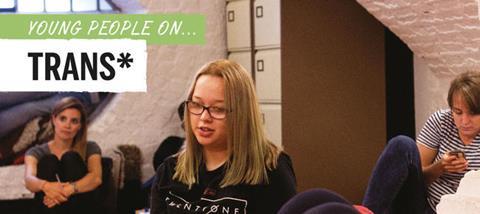
Can anyone describe transgenderism to me?
Shawtae: It’s when a man changes his sex to be a woman, or the other way around.
Ciaran: It’s not necessarily a bad thing if you want to do it. It’s not good if you make fun of somebody who would do that because you could really upset them and it could lead to something like suicide.
Katie: I think that it depends on the person. Because it doesn’t just have to be from female to male or male to female, because you could be gender-fluid or both genders and just be completely non-binary. Obviously it depends on your religion, or your circumstances or culture, but I think broadly you should be who you want to be, and if you don’t feel comfortable the way you are, you should be someone different.
Shawtae: For me, I know people have their reasons for doing it. They might do it because they’re going through struggles in life, but I don’t understand how changing your gender relieves the struggle. I think there are different ways of getting rid of stuff that’s going on rather than changing your gender.
Nmeso: I don’t think changing your gender is the best option because I think that when you get baptised they say you start with a new beginning, so this is just changing who God made you to be, and it’s saying that you don’t like it and want to change that.
Katie: I don’t think being trans is always about changing yourself, because if you transitioned into another gender, you’re still the same person you were before the transition. But I think transitioning is changing yourself to suit your identity, and you’re never going to feel comfortable with yourself until you fulfil who you want to be. I think you should do the most loving thing for yourself.
Ciaran: It’s such a big thing to do that. If you don’t respect it, then I’m sorry but you’re a bad person, because it’s what that person wants to do and it’s their choice and their life.
Eno: Personally, I don’t understand the point of changing your gender. Sorry. Not all religious people are like this, but as a religious person, God created you to be who you are. If you come out as a woman you come out as a woman, and if you come out as a man you come out as a man. When you think about it, people who are transgender change parts of their bodies, like changing the downstairs parts and stuff like that, it’s very expensive and there are cons to things like that. And if there are cons to things like that then it’s like a sign that it’s not useful.
Ademola: I totally understand that point, but at the same time I think you need to recognise that for people who are changing their outward appearance, it’s more than just your outward appearance: it’s how you feel on the inside as well, so if you’re somebody who is a woman and they feel like a man, that person, to themselves anyway, has felt like a man all their life, but at a certain stage, they’re like: “Now I want my outward appearance to reflect how I feel on the inside.” And so that is why they feel they need to make the transition.
There’s a distinction between your sex, as in your biological characteristics, and then your inside sex, your gender, because lots of people make the claim that gender is really fluid. When you come out of the womb you don’t come out with braided hair and earrings, you’re basically socialised into being a man or socialised into being a woman. You need to deconstruct how you think about society and at large when you think about these sorts of things. Because before I used to be quite close-minded when it came to transgenderism, but when I started to listen to these people, and listened to what they had to say, you actually realise: “Oh, these things I’m thinking aren’t even biblical in the first place.”
But transgenderism is a big leap to me, especially to take hormone replacements and change your genitals, but I think with people who are prepared to make that leap, what have they been struggling with their lives so far? It must have been really difficult to get to that place, it’s probably something that they’ve really thought about, so as a Christian you have to come from the perspective: “I understand where you’re coming from, but how can I help you?”


































